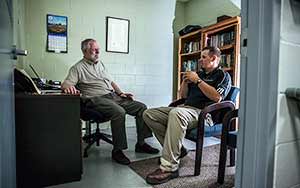What do you want to be when you grow up? This is a question we commonly ask of children.
Responses we may hear are a police officer, a nurse, a movie star, a ball-player, or any number of fascinating livelihoods. But what if we were to ask Jesus Christ what he wants us to be when we grow up? I think he would have the same answer for every one of us: “I want you to be different. I want you to be a servant.”
On one occasion, Jesus sat among a large group of people and taught them some bottom-line truths about how he wanted them to grow up. In his “Sermon on the Mount,” (Matthew 5-7) the overarching theme of his message was, “Be different.” “Be a source of light in a world of darkness. Be a person of authenticity in a world of hypocrisy. Be a compassionate soul in a world of bruising indifference. Be a servant.”
 Servant leadership has become a popular term. Often those who speak and write about it focus on the second word more than the first. With this emphasis, serving is a means to an end. “I’ll serve you to prime the pump so that you’ll make me look good as a leader.” This is just a more subtle form of positional leadership.
Servant leadership has become a popular term. Often those who speak and write about it focus on the second word more than the first. With this emphasis, serving is a means to an end. “I’ll serve you to prime the pump so that you’ll make me look good as a leader.” This is just a more subtle form of positional leadership.
What Does Servant Leadership Really Mean?
Our belief at Alexandria Industries is that leaders exist to serve. Servant leadership should not be a manipulative method for attaining power or success. It is not a technique, formula, or gimmick. It is not about what is efficient, economical, or easy. Servant leadership consists of the difficult, daily work of moving people from where they presently are toward the destination further along that God has appointed for them. It requires leaders who are authentic, vulnerable, available and useful.
Our commitment to servant leadership is not motivated by setting sales records, accomplishing our tasks perfectly, or trumpeting our success. As aspiring servant leaders, we realize that we will never become experts. There will be no certificate of completion on this side of heaven. It is a lot easier to talk about servant leadership than to put it into practice. We will always be students seeking to learn more, striving to do better. We will fail often and try again.
The reverberating impact of Christ’s movement was not because he developed a strategic plan or cast an intricate vision. Instead he decided to pour himself into the lives of twelve men, to train them so thoroughly that they would carry his mission on after he was gone. As they loved and served others, they multiplied themselves and expanded his message and ministry throughout the world.
One day, Jesus pulled his disciples aside and spelled out for them the sharp contrast between his philosophy and the world system in which they lived. “You know that the rulers of the Gentiles lord it over them, and their high officials exercise authority over them. Not so with you. Instead, whoever wants to become great among you must be your servant” (Matthew 20:25,26).
Jesus was saying that much of the world may operate according to positional lines of authority, but in the kingdom of God there is one occupation above all others. The One who could have been or done anything, consciously and voluntarily chose to be a servant. Since the Son of God took upon himself that role, so must we who desire to be like him.
 The question for us is not “What do you want to be when you grow up?” It is, “What are you becoming, now that you’re grown?”
The question for us is not “What do you want to be when you grow up?” It is, “What are you becoming, now that you’re grown?”
If we can assist you in any way, or if you would like to share a concern with the Alexandria Industries Prayer Team, please contact our Corporate Chaplain at rhansen@alexandriaindustries.com or (320) 762-7678.
